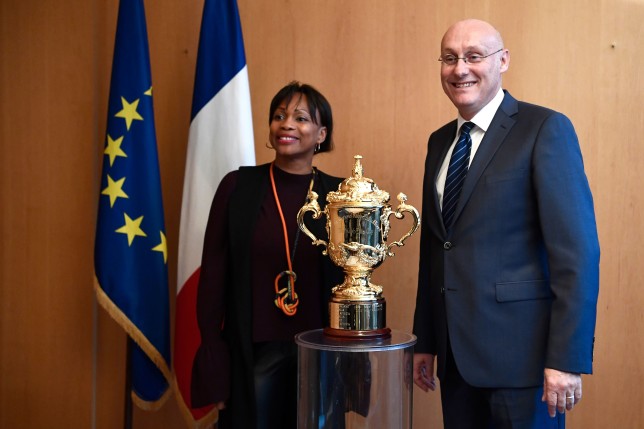
It was meant to be the perfect process.
The way for World Rugby (WR) to avoid all the scandals, drama and intrigues that have beset the awarding of recent Olympics Games and Football World Cups.
The IOC and FIFA have both been so stained by the corruption allegations stemming from those recent bid processes that it is doubtful they will ever regain their former lustre.
So WR was going to avoid all the lobbying, secret gifts, bribes and lavish “host country visits” that have so tarnished the IOC and FIFA.
The idea was to appoint an independent committee of experts who would do a thorough evaluation of all three bids – South Africa, France and Ireland (Italy withdrew before the official bid process began) – and come back with a recommendation.
This recommendation would then be rubber-stamped by the World Rugby Council. Simple, transparent, thorough. So why did it all go so horribly wrong?
It would be easy to sum all the problems up in two words – Bernard Laporte – but that would be a superficial reading of what unfolded after the recommendation was made at the end of October (South Africa) until the announcement of the successful bid (France) two weeks later.
Certainly the outspoken former scrum-half and Toulon and France coach played a major role in the setting aside of the recommendation, a decision that was rightfully called a humiliation to World Rugby and especially chairman Bill Beaumont.
Certainly once the expert evaluation came out, and it did not nominate France, Laporte’s objective became clear – to discredit the report at all costs.
He carried out a well orchestrated media campaign, each day targeting a different area of the report and using a different outlet to carry his message.
First it started with Le Figaro in France criticising the process of compiling the report.
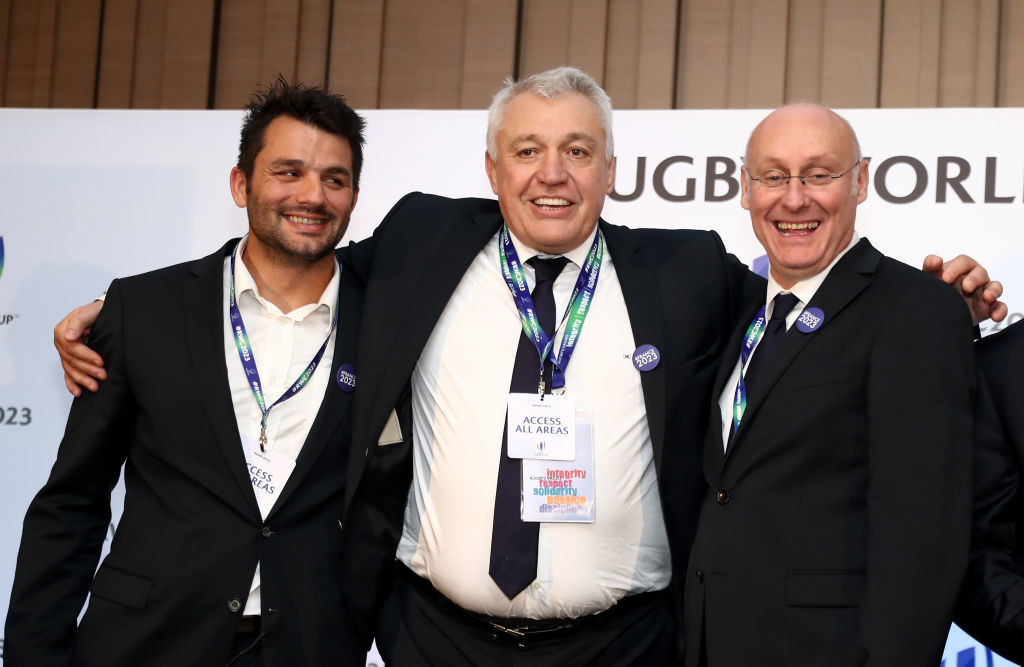
Bernard Laporte (R) of the French bid team and Claude Atcher (C), the France 2023 bid chairman celebrate after being annouced as the host nation for the 2023 Rugby World Cup during the Rugby World Cup 2023 Host Decision at Royal Garden Hotel on November 15, 2017 in London, England.
“What bothers me, primarily, is that the process was misguided, flawed,” started the former Minister of Sport. “ World Rugby told us that two external and independent companies would be mandated to conduct the audit. There was only one, and they ignored some aspects.
“In the end, 80 per cent of the report was made by World Rugby employees. I do not like being lied to.” World Rugby countered this saying that the London-based The Sports Consultancy, Dow Jones Sports Intelligence and IMG assisted the technical review group.
Next Laporte started to target individual findings of the report, taking them out of context to make them seem nonsensical.
“We are not rated as well over doping because they tell us that we are too strict,” Laporte told AFP. “In security, we have the same number of points even though there are 52 murders a day in South Africa. It’s crazy.”
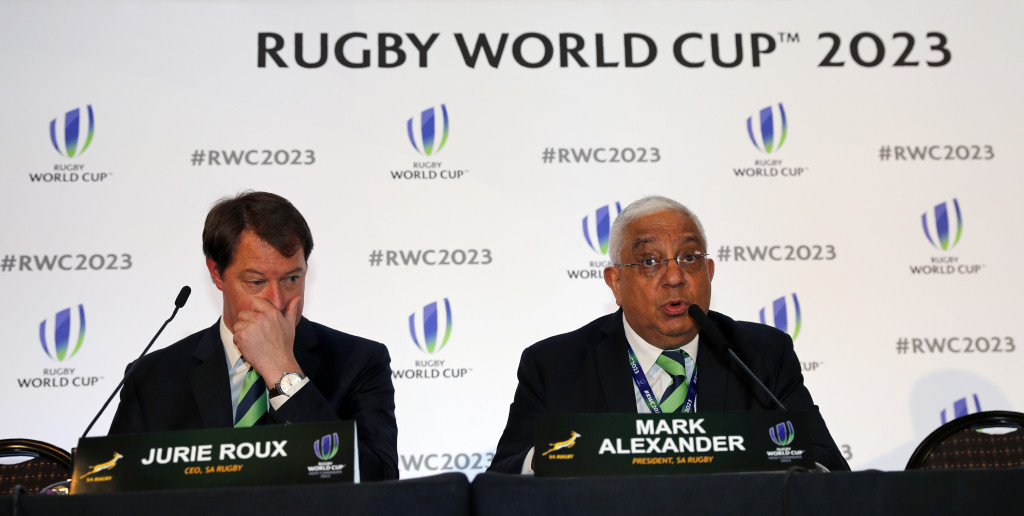
South Africa’s bid team Chief Executive Jurie Roux (L) and Mark Alexander President of SA Rugby hold a press conference after France was named to host the 2023 Rugby World Cup.
This particularly crude statement struck a chord gaining considerable coverage worldwide.
Ireland then saw their chance to tarnish the report, which ranked them last of the bids, and also began to publicly attack the findings.
South Africa stood by mute; horrified that Laporte was so blatantly attacking a process all three nations had agreed to in advance.
Laporte then went for the kill, ramping it up in an interview with The Times: “France is the leader in the crackdown and fight against doping worldwide.”
“If the World Anti-Doping Agency (Wada) sees this report, they will not believe it. It is laughable.”
A French broadsheet, a French based new agency and an English daily – three angles perfectly placed and surgically delivered.
And Laporte’s campaign worked perfectly, so well that when the vote did come more than half of the World Rugby Council dis-regarded the recommendation and chose France as the host nation for 2023.
In terms of the voting the Tier 1 nations not involved in the bidding process (England, Wales, Scotland, Italy, Argentina, Australia and New Zealand) received three votes each; Japan and the regional associations (Oceania, South America, North America, Africa, Europe and Asia) all had two votes; and the other Tier 2 unions – Canada, USA, Georgia and Romania – had a single vote each.
With 39 votes to be cast, a simple majority of 20 votes was required to get one of the bids over the line.
The first round of voting went: France 18, South Africa 13, Ireland 8; leading to a second round of voting that went: France 24 South Africa 15.
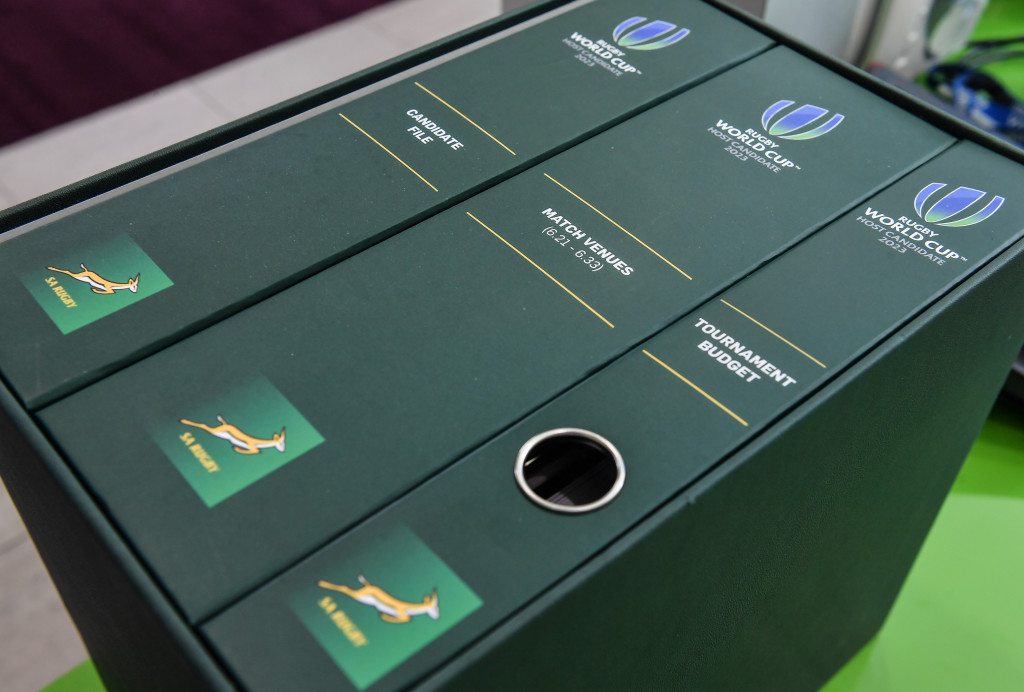
A view of the SA Rugby bid submission for the 2023 Rugby World Cup handed into World Rugby.
As Steve Tew, the powerful and well-respected CEO of the New Zealand Rugby Union hinted beforehand, South Africa’s SANZAAR partners (New Zealand, Australia and Argentina) all stuck with the expert recommendation.
“It seems odd to have an independent evaluation process done and then ignore the recommendation,” Tew said. “Unless there is a very, very good reason to do that. We don’t play any other games in rugby.”
Tew used the words “don’t play any other games”, trying to distance the process from the Olympics and FIFA fracas, but clearly games were being played.
Or what possible reason could there be for Home Nations compatriots Wales and Scotland deserting Ireland’s bid or Japan, Italy, Asia, South America, Europe, Africa, Georgia and Romania all giving a two-fingered salute to the recommendation and siding with France.
The fallout after the bid winner was announced has been catastrophic for World Rugby – just as much as for the IOC and FIFA.
Ireland immediately blamed Wales and Scotland although those six votes would not have changed the result.
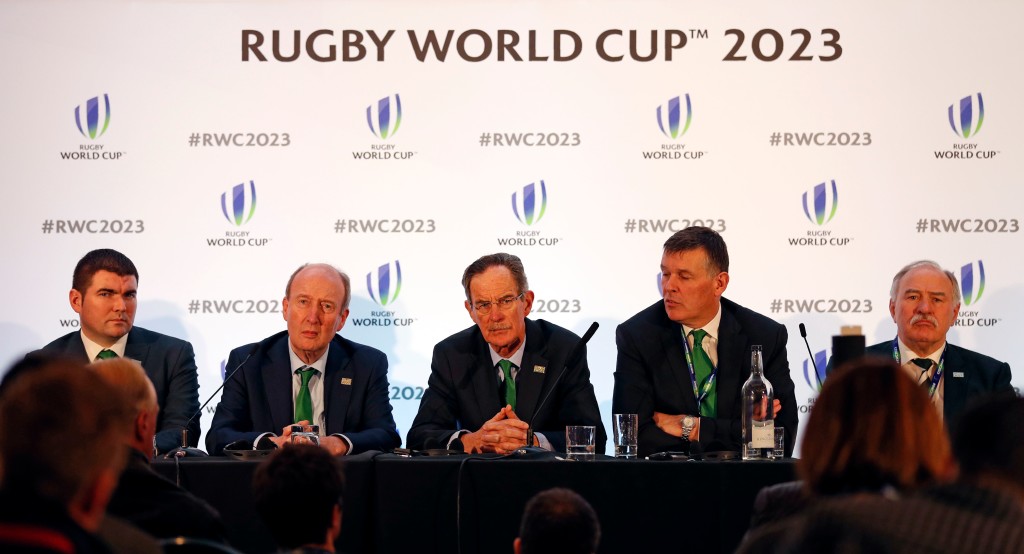
Ireland’s bid team (L-R) – Ireland’s Sports minister Shane Ross, Ireland 2023 Bid Chairman Dick Spring and Irish Rugby chief Philip Browne hold a press conference after France was named to host the 2023 Rugby World Cup in London on November 15, 2017.
“The bottom line is that we were disappointed that Scotland and Wales didn’t vote for us,” Irish Union chief Philip Browne said. “They had reasons. Scotland wanted to go for the money and Wales wanted to effectively support Gareth Davies (Chairman of the WRU), who was part of the evaluation process.”
Wales backing their bid because their Chairman helped write it? Scotland going for the bid that gave them the most money? Hardly the fair, transparent, unbiased process WR touted.
Springbok 1995 RWC winning flyhalf Joel Stransky didn’t hold back, labelling WR an “old boys’ club.”
“We are all bitterly disappointed and quite shocked,” he told South African TV channel SuperSport.
“One has to ask the question, why has the vote gone against the recommendation when most of the unions said they would vote with the recommendation? It’s bitterly disappointing and quite surprising.
“You can only imagine the lobbying that has gone on behind the scenes and the one thing that it does fix in my mind is that it is an old boys club still making decisions at World Rugby.
“Ultimately, your bid can be as good as you like, but you have to lobby to get those blokes on your side. Which means nothing has really changed, so what is the point of having an independent auditor if you are not going to take the recommendation?”
What is the point, indeed.
So bad was the fallout that up to just a few days ago Beaumont was fending off calls to resign. The former England captain countered saying he didn’t design the process. It was approved in the reign of his predecessor, co-incidentally another French man called Bernard, Lapasset.
“I haven’t considered resigning, no,” said Beaumont. “I came into this process as chairman in May 2016, long after it had got under way and legal advice was that we had to abide by due procedure as in the original bid document.
“There was a Council vote [in May 2017] to have a recommendation and only the Rugby Football Union voted against it.”
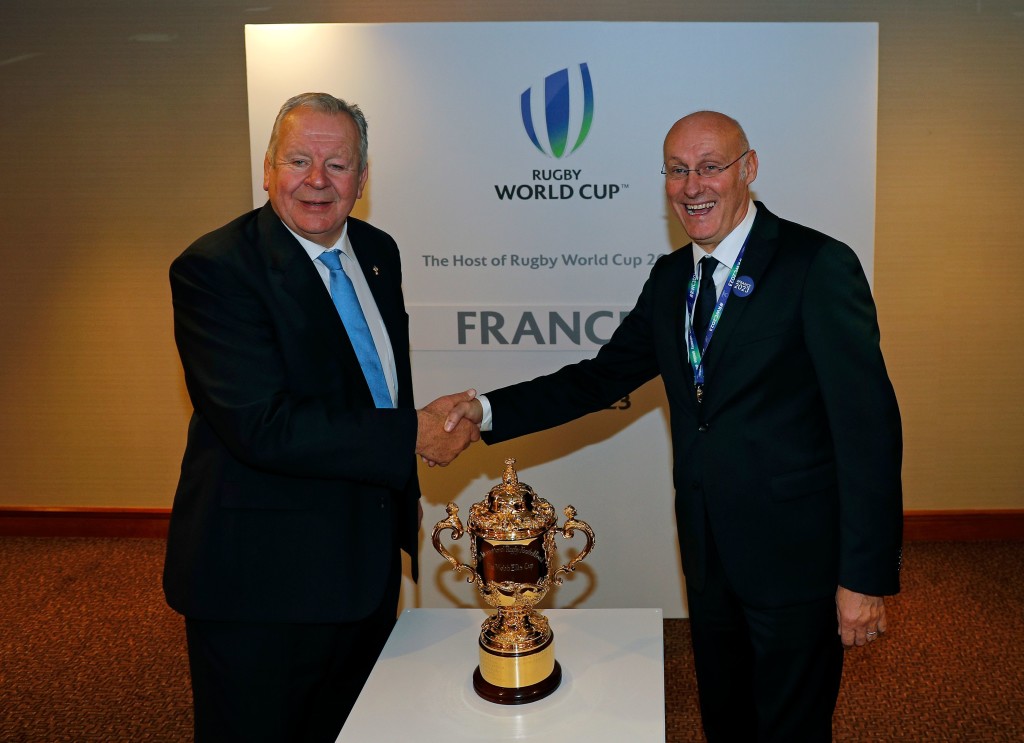
Chairman of World Rugby Bill Beaumont (L) shakes hands with French rugby President Bernard Laporte (R) after France is named to host the 2023 Rugby World Cup in London on November 15, 2017.
He did admit however that the process needed to be re-considered.
“We will examine all aspects now: the recommendation and the secret ballot and all other aspects.
“Without a doubt, all that will be reviewed. If mistakes have been made, they have been made in innocence.”
The saying “road paved … good intentions” comes to mind.
It’s clear mistakes have been made but the biggest one is that the process was caught in the middle – half in, half out – public, private.
If the idea was to follow the committee’s recommendation then why even have bid presentations?
Ireland went to town on theirs with cameos from Bono, Bob Geldorf and Liam Neeson while France drew howls of derision by dragging the great Jonah Lomu’s young sons into the process.
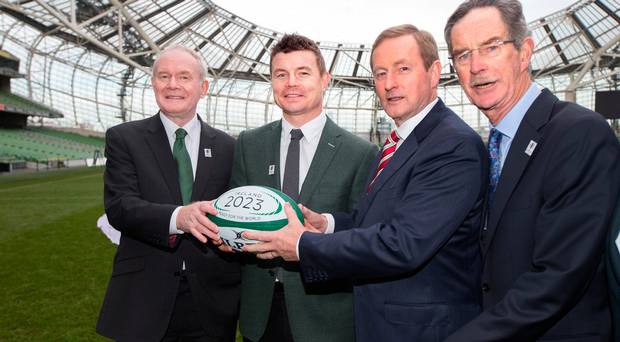
These presentations were followed by lengthy media conferences and furious public lobbying.
Wasn’t that what this recommendation process was meant to do away with?
And then why make the evaluation report public and give a two week window for a strident voice
like Laporte to dis-credit it? A task that was made all the easier as no one was appointed to defend the report.
In the end pride has come before the fall, as World Rugby fell over their own very well polished feet.
There was very little controversy around the awarding of previous Rugby World Cups and all the evaluation fiasco has done is put the spotlight on a process that did not need to be spotlighted.